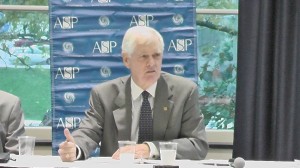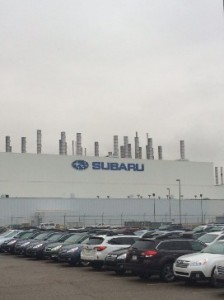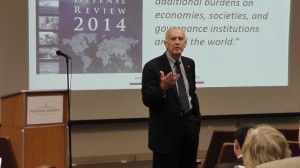ASP in Indiana: Climate Change and Security in the Heartland
On Tuesday and Wednesday, October 14 and 15, representatives of the American Security Project visited Indianapolis, Indiana for a series of meetings, public events, and briefings on how climate change is affecting security, how institutions in the region are planning for it, and how.
Attending were Lieutenant General John Castellaw, USMC (ret.) and Lieutenant General Arlen “Dirk” Jameson, USAF (ret.). Castellaw was a 36 year veteran of the Marine Corps and now serves as the Director of the Crockett Policy Insititute and a member of the ASP Board. Jameson served in the Air Force for more than three decades, most of them in strategic missile forces; since retirement, the lifelong Texan has been involved in military and commercial space businesses and has served as Executive Director of the Texas Telecommunications Infrastructure Fund. Both are members of ASP’s Consensus for American Security. Andrew Holland, ASP’s Senior Fellow for Energy and Climate, and Porter Brockway, ASP’s events manager, rounded out the delegation.
Butler University
 The first stop of the tour was a public event at the Butler University’s Robertson Hall. Hosted by Butler’s MBA students association, the event drew over 40 students, faculty, and community members to the discussion. Holland laid out the facts about climate change in a presentation, and then Generals Castellaw and Jameson discussed how climate change is going to change the operating environment for the military, and discussed some of the threats that poses. Castellaw discussed threats in the Middle East and Africa, drawing on his many years of experience in the region. Jameson discussed the threats to security in the Pacific, and how uncertainty in planning makes the future difficult. After their presentations, Dr. Peter Grossman, an economics professor from Butler discussed how the problems that the government has in developing and following through on any energy policy makes the challenges of climate change even more difficult.
The first stop of the tour was a public event at the Butler University’s Robertson Hall. Hosted by Butler’s MBA students association, the event drew over 40 students, faculty, and community members to the discussion. Holland laid out the facts about climate change in a presentation, and then Generals Castellaw and Jameson discussed how climate change is going to change the operating environment for the military, and discussed some of the threats that poses. Castellaw discussed threats in the Middle East and Africa, drawing on his many years of experience in the region. Jameson discussed the threats to security in the Pacific, and how uncertainty in planning makes the future difficult. After their presentations, Dr. Peter Grossman, an economics professor from Butler discussed how the problems that the government has in developing and following through on any energy policy makes the challenges of climate change even more difficult.
As the majority of the audience were business students, questions from the audience focused on how climate change will impact their future careers – including how to price risk in insurance markets, and how climate change presents a real business opportunity for those companies that can provide services that either adapt or mitigate climate change. One of the most interesting questions was about how to motivate the American public – with the understanding that Americans do not want to do little things – they focus on big, important issues.
The program at Butler was facilitated by Barry Dunham, MBA student at Butler and ASP Adjunct Fellow, and Tim Bennett, the Director of Graduate Programs at the Butler University College of Business. ASP is grateful for their support. The entire event is available as a podcast, so take a listen.
Audio of Butler University Discussion
Subaru of Indiana Automotive
The following morning, ASP drove out to Lafayette, Indiana, the home of Subaru’s only auto assembly plant in the Western Hemisphere at Subaru of Indiana Automotive (SIA). This large factory has a footprint of 3 million square feet, produces hundreds of thousands of cars per year, and employs about 4,000 workers. Uniquely for such a major factory, it also is in a designated wildlife habitat and adds zero waste to landfills.
 In 2002, the SIA’s parent company, Fuji Heavy Industries, decided to set a goal of turning the facility into a zero-waste facility within 5 years. They achieved the goal within two years by following the mantra of “reduce, re-use, and recycle” – in that order. Denise Coogan, the Manager for Safety and Environmental with SIA, explained how the company and their workers achieved this goal by working with parts suppliers to reduce the size of shipping boxes, or to ship in re-usable containers. She discussed how the act of measuring waste and incentivizing waste reductions led to big jumps. A part of managers’ bonuses are based on how they meet waste reduction goals, and line-workers are rewarded for making suggestions that reduce waste.
In 2002, the SIA’s parent company, Fuji Heavy Industries, decided to set a goal of turning the facility into a zero-waste facility within 5 years. They achieved the goal within two years by following the mantra of “reduce, re-use, and recycle” – in that order. Denise Coogan, the Manager for Safety and Environmental with SIA, explained how the company and their workers achieved this goal by working with parts suppliers to reduce the size of shipping boxes, or to ship in re-usable containers. She discussed how the act of measuring waste and incentivizing waste reductions led to big jumps. A part of managers’ bonuses are based on how they meet waste reduction goals, and line-workers are rewarded for making suggestions that reduce waste.
Importantly, Ms. Coogan explained that these initiatives were not about being “green” – they are about the bottom line. She estimates that the environmental accounting shows a $10 million annual benefit to the company by these zero-waste initiatives.
Only recently has the company added energy and water efficiency targets to their environmental goals. This means that every update in the factory is put through an accounting that includes Kilowatt Hours, Carbon Dioxide, and costs. With these standards in place, we may see similar reductions in energy use to match their zero-landfill goals.
As the factory is expanding, and workers are putting in overtime hours, the SIA shows how a company can both help the bottom line and help the environment. Addressing the problems of climate change does not have to be zero-sum for companies – this is a win-win.
Threats to Security in Indiana
After returning to Indianapolis, the delegation met with senior leaders for Indiana’s Public Safety and Energy, within the Governor’s office. The meeting was off the record, but they discussed ASP’s report, “Climate Change and the Threats to the American Midwest.” This paper shows how climate change threatens the region’s agriculture, economy and population. It discusses how agriculture – the base of so much in the Midwest – is likely to become more variable, with longer growing seasons, but also threats to productivity from extreme weather events. It shows how the Great Lakes are threatened by invasive species and algae blooms, and it shows how warming will make already polluted cities even more dangerous to human health.
Anderson University
 The final stop on the tour was at Anderson University is a private Christian university in central Indiana. It was established in 1917 by the Church of God (Anderson, Ind.). Anderson is a part of ASP’s University Partnership Program.
The final stop on the tour was at Anderson University is a private Christian university in central Indiana. It was established in 1917 by the Church of God (Anderson, Ind.). Anderson is a part of ASP’s University Partnership Program.
At this event, ASP spoke to a group of about 50 undergraduate students as well as members of the local community about how climate change was impacting national security, and why that matters to small towns like Anderson. The audience was interested and engaged in the topic – they were particularly excited to hear about how climate change threatens agriculture. General Castellaw explained: “One of the areas that we are actually very concerned with is in food security. By 2050, we’ll have two billion more people in the world, and we need to maintain the amount of food that we now produce.”
The Andersonian, Anderson’s student paper, included an article about the event, “Climate Change Discussed.” The full video and audio of the event is also available.
Audio of Anderson University Discussion






[…] ASP in Indiana: Climate Change and Security in the Heartland […]